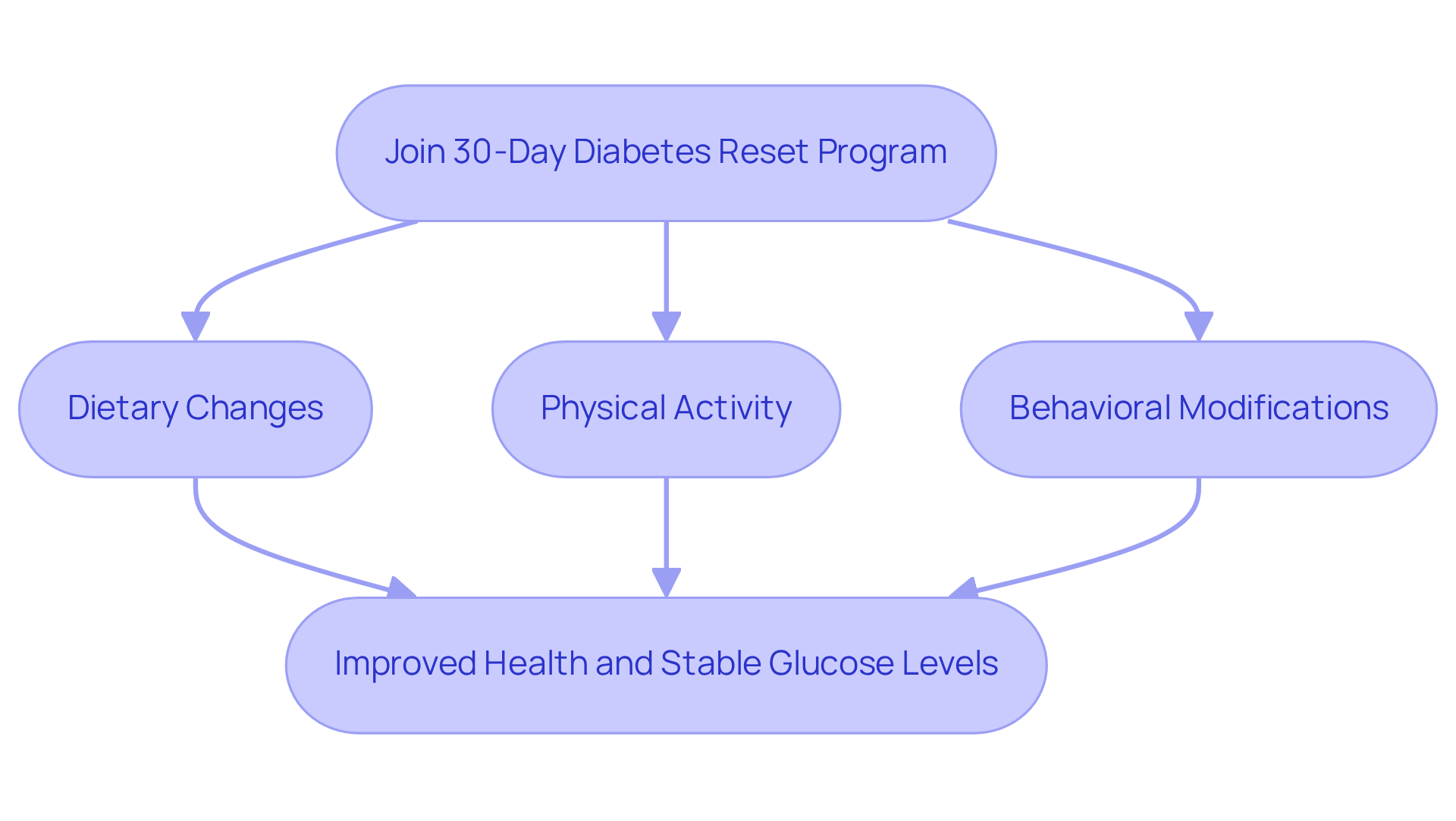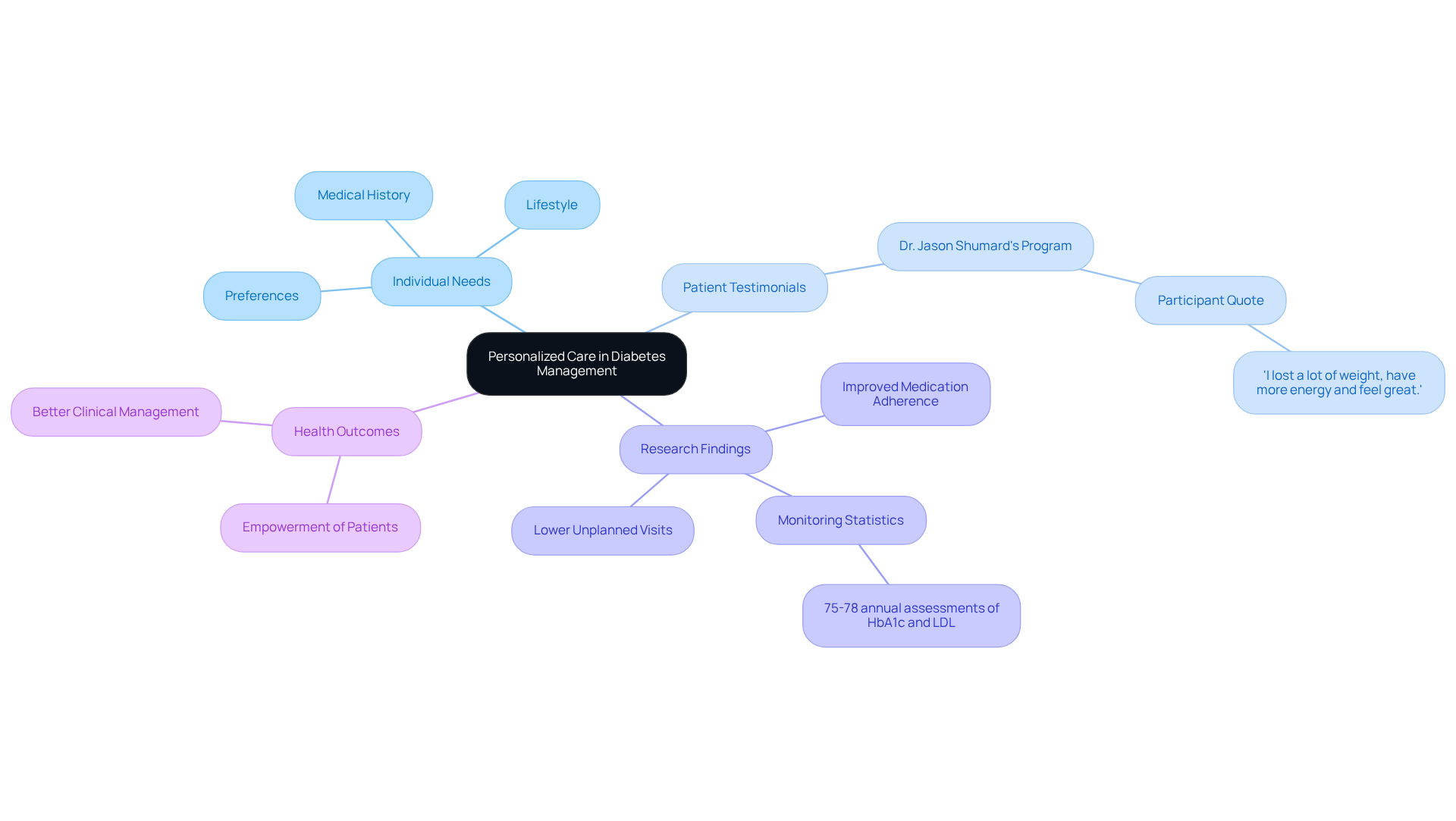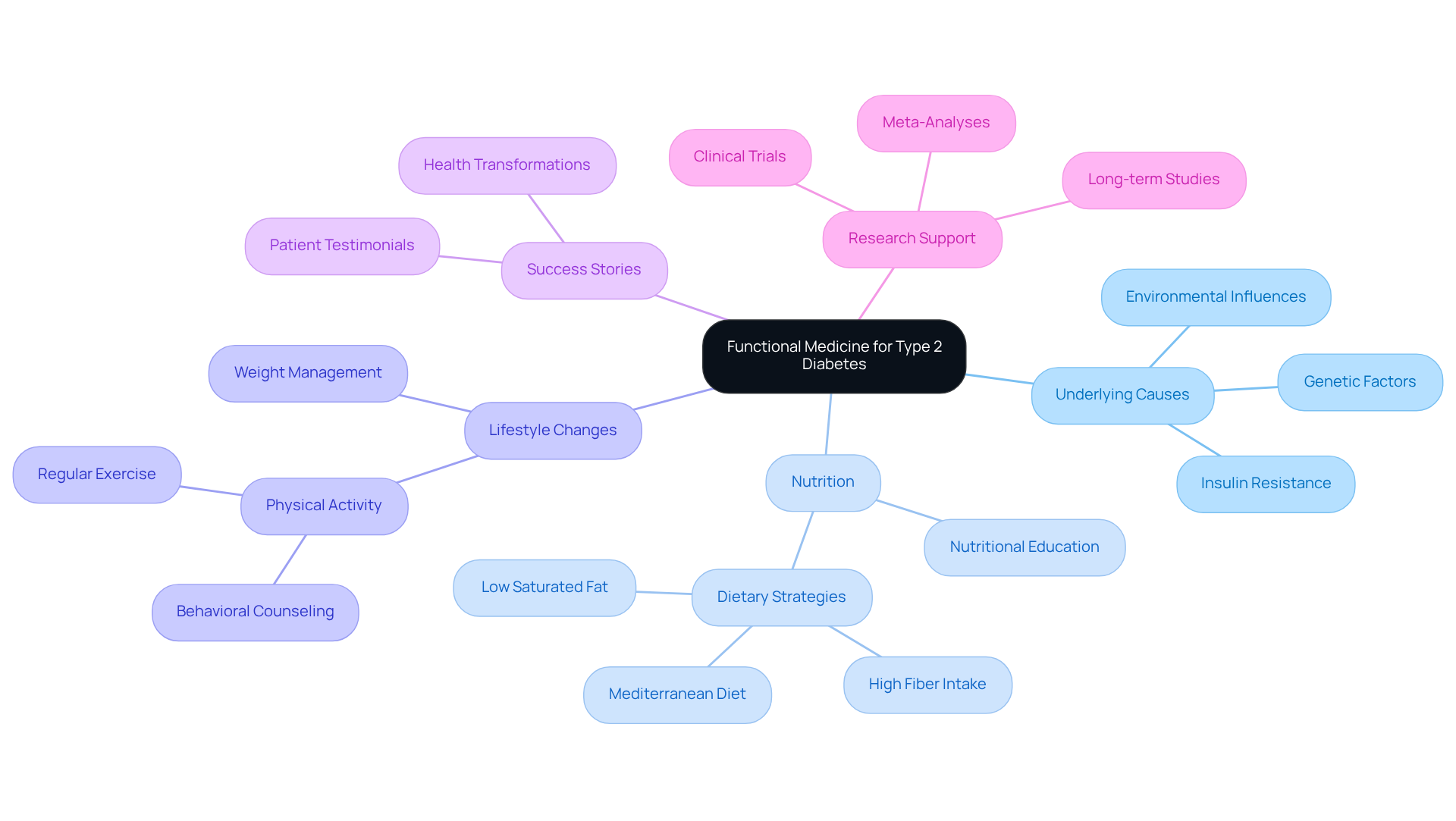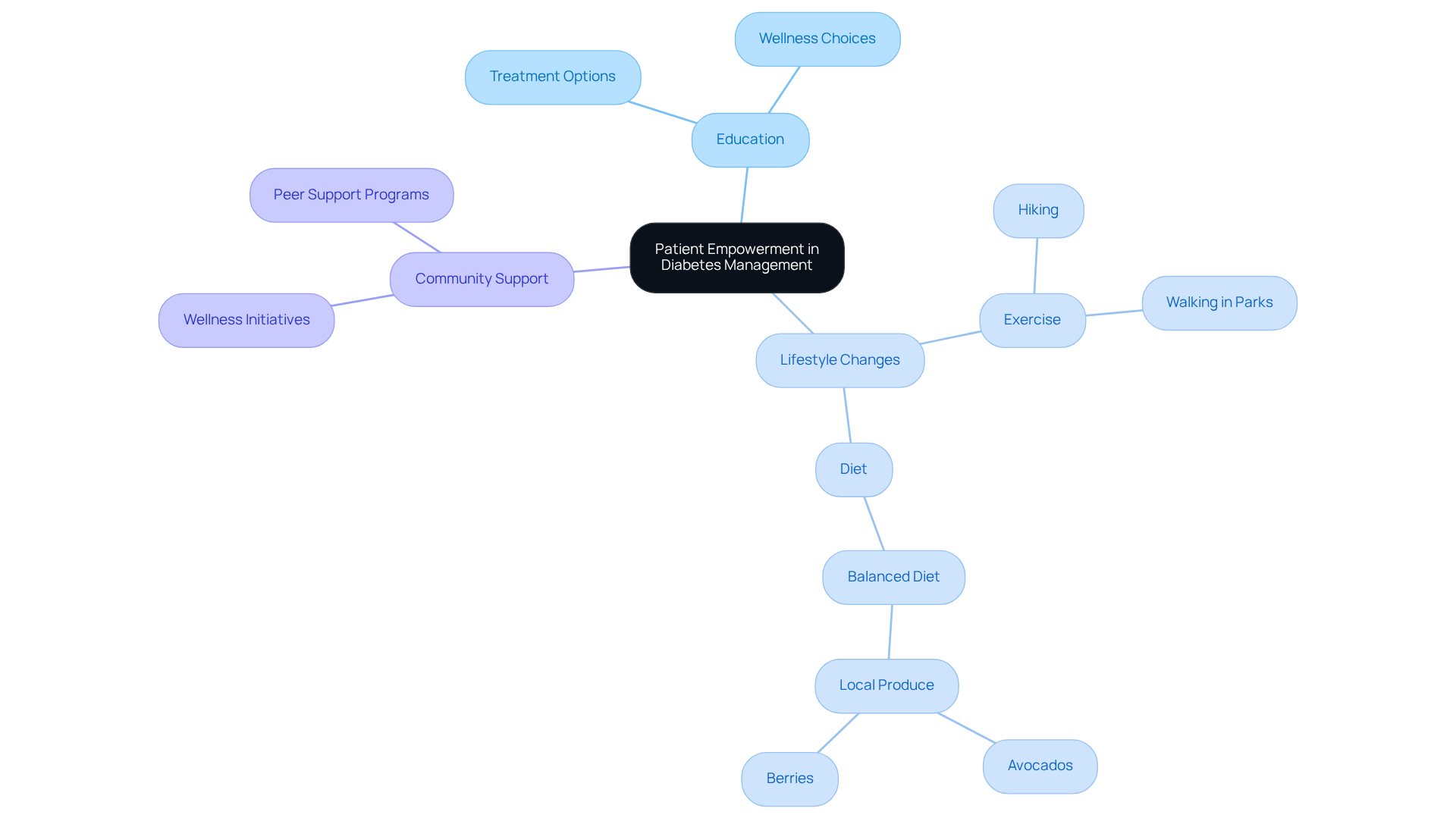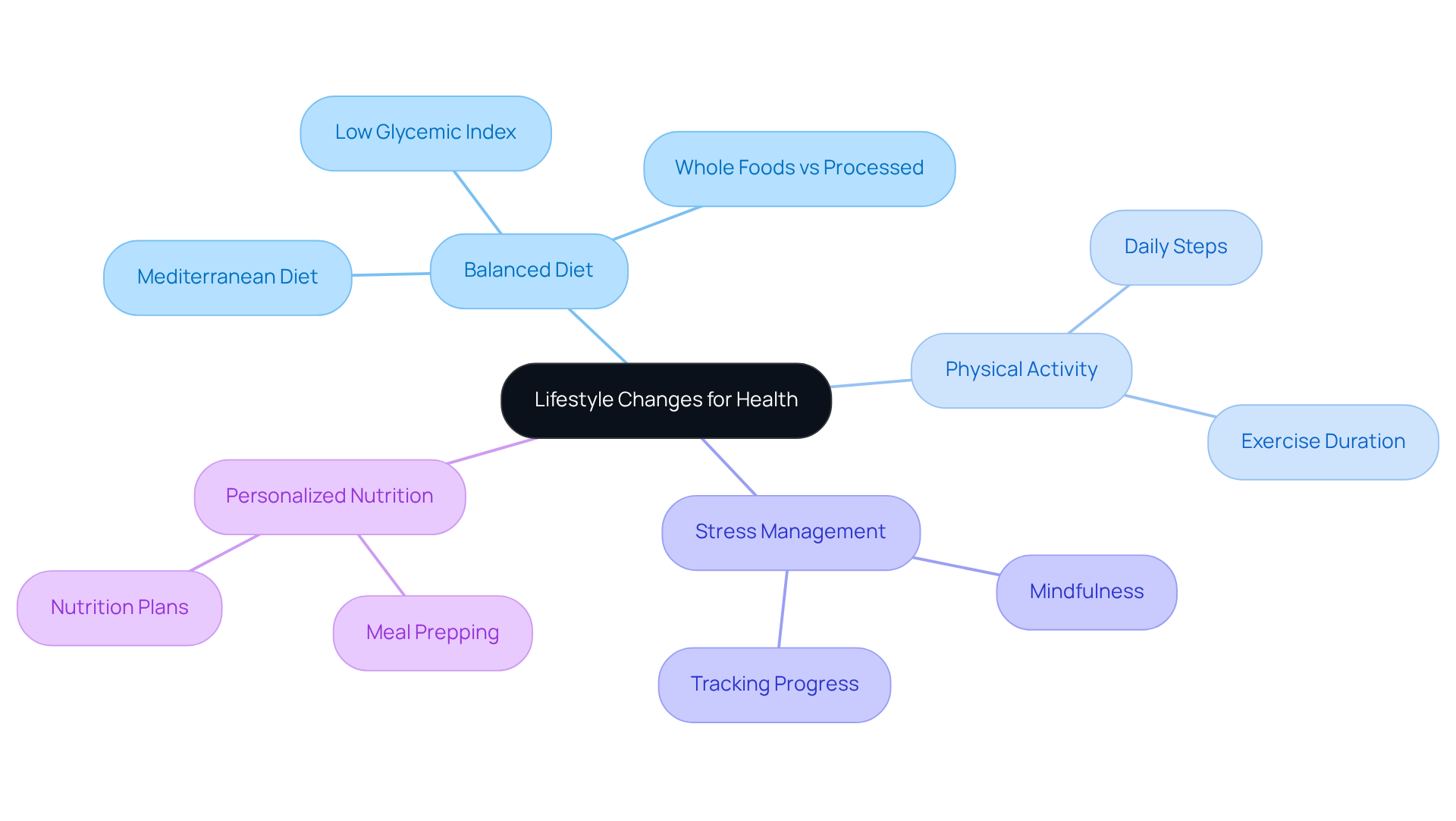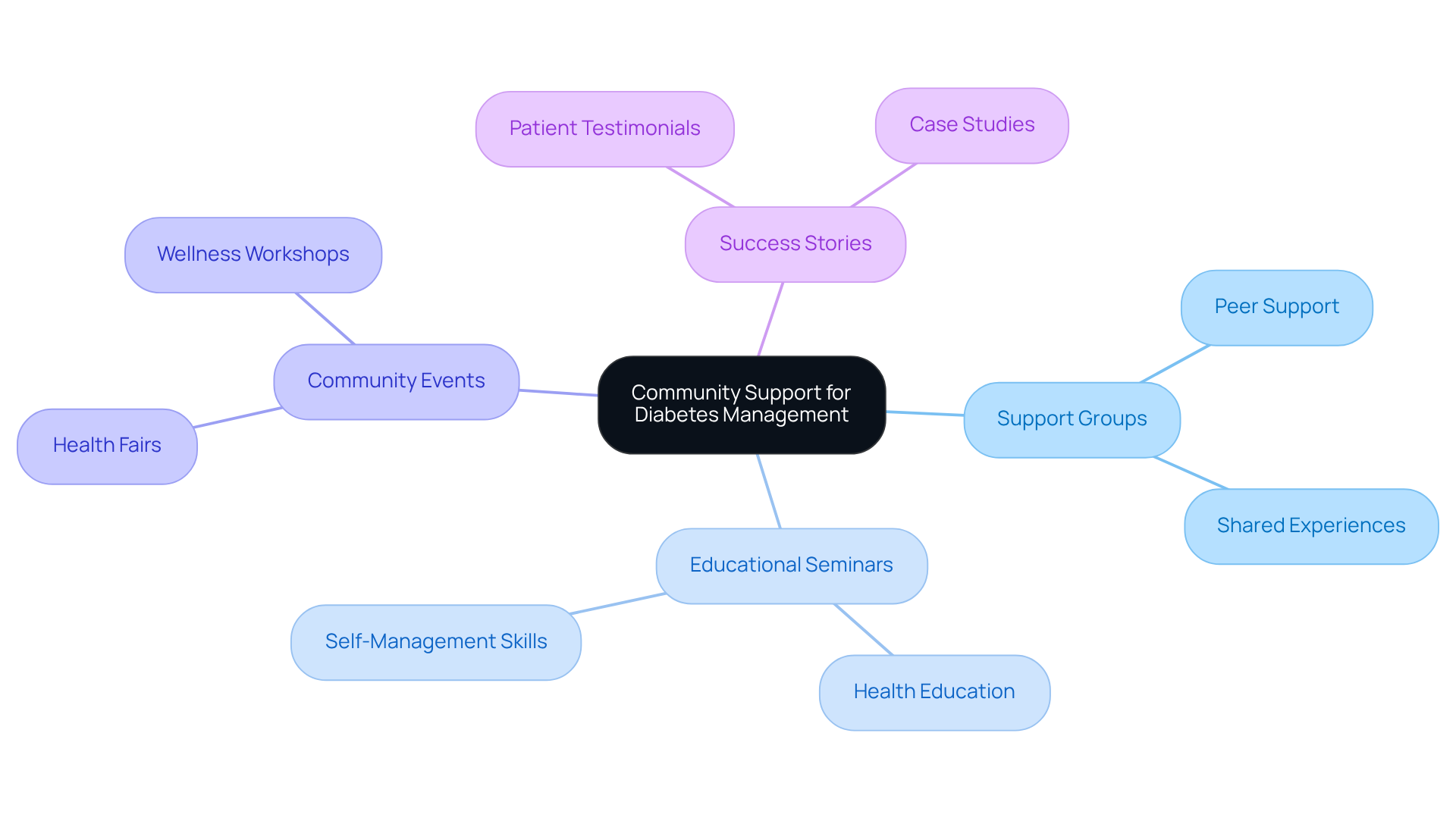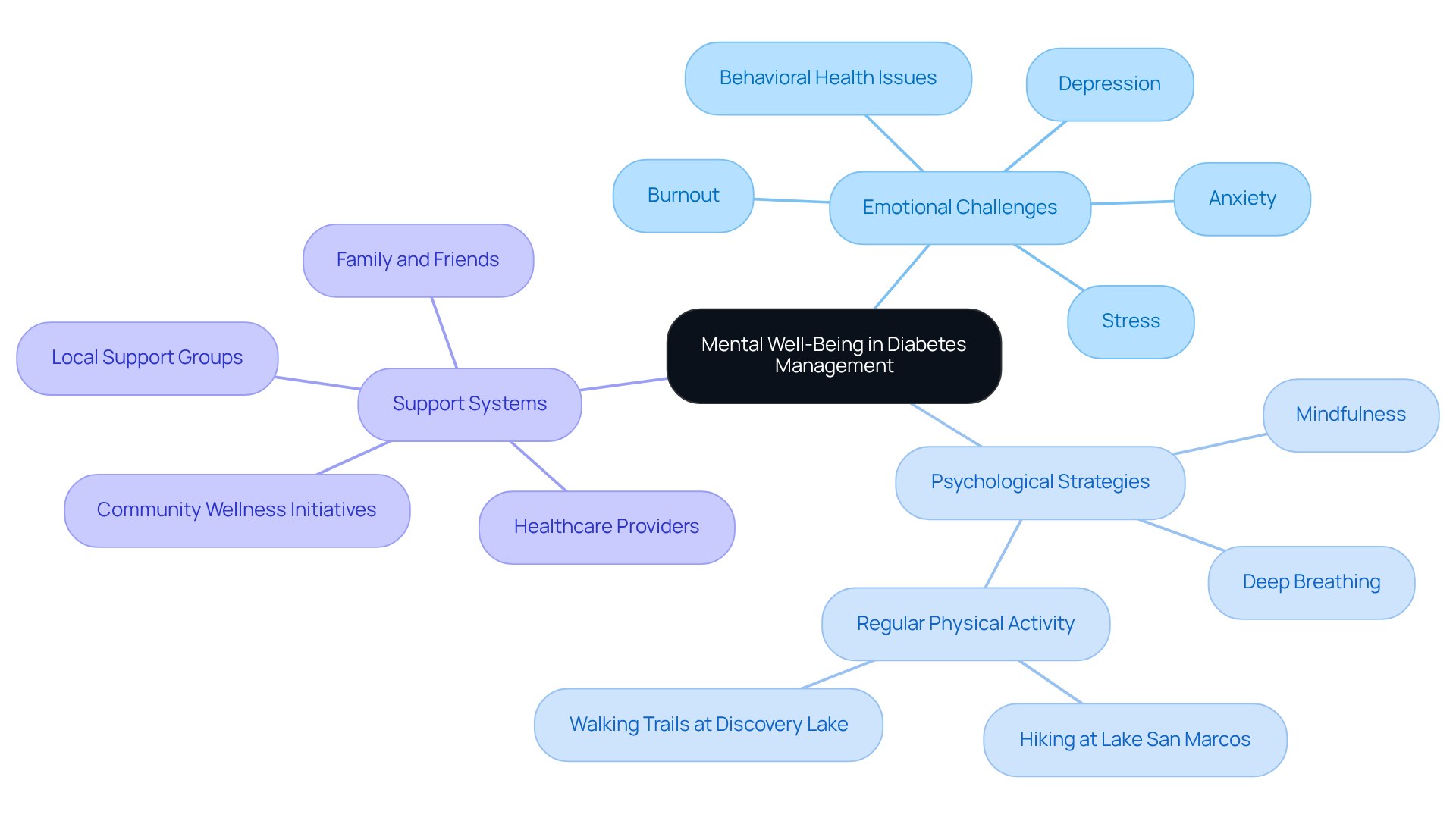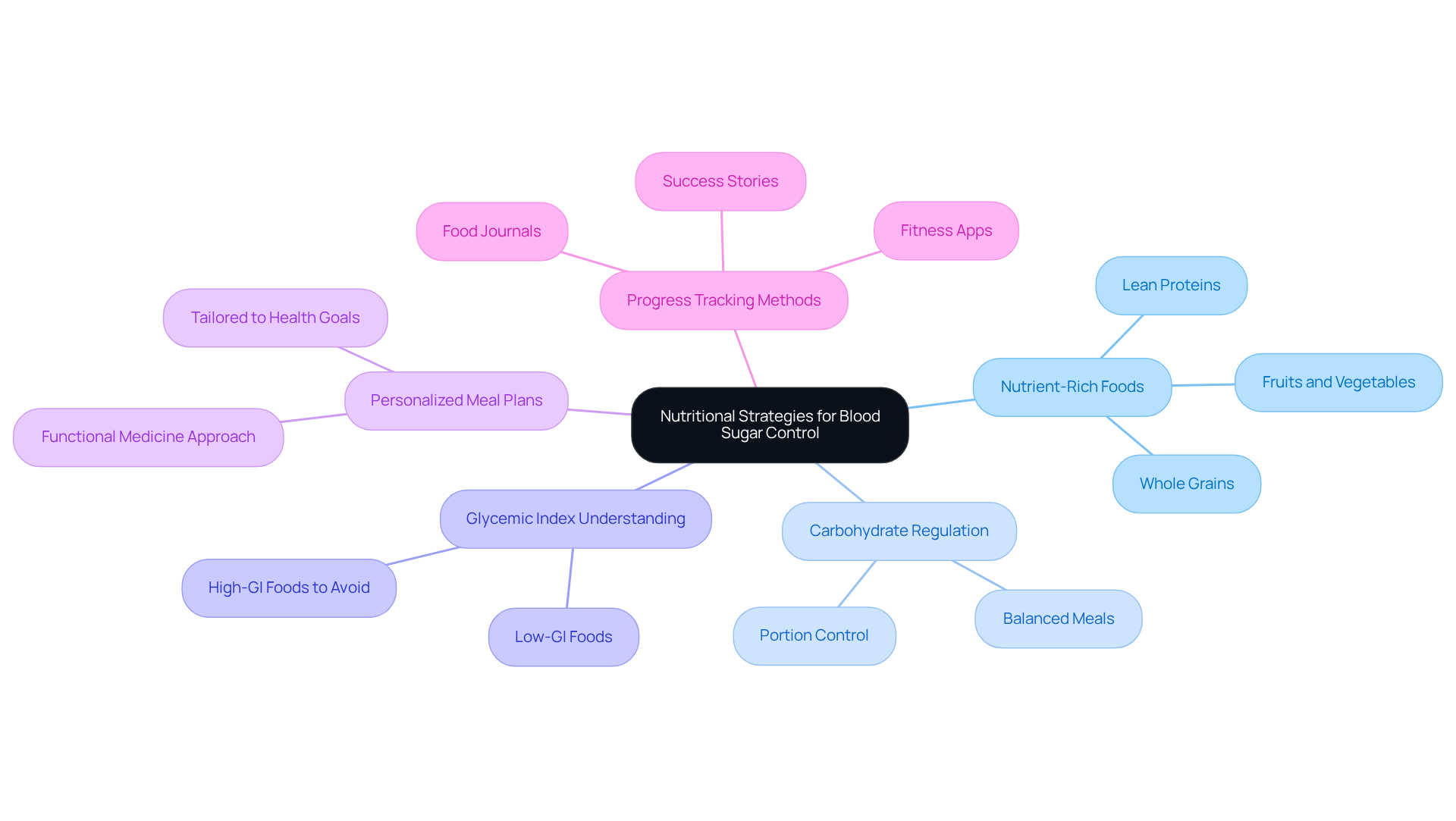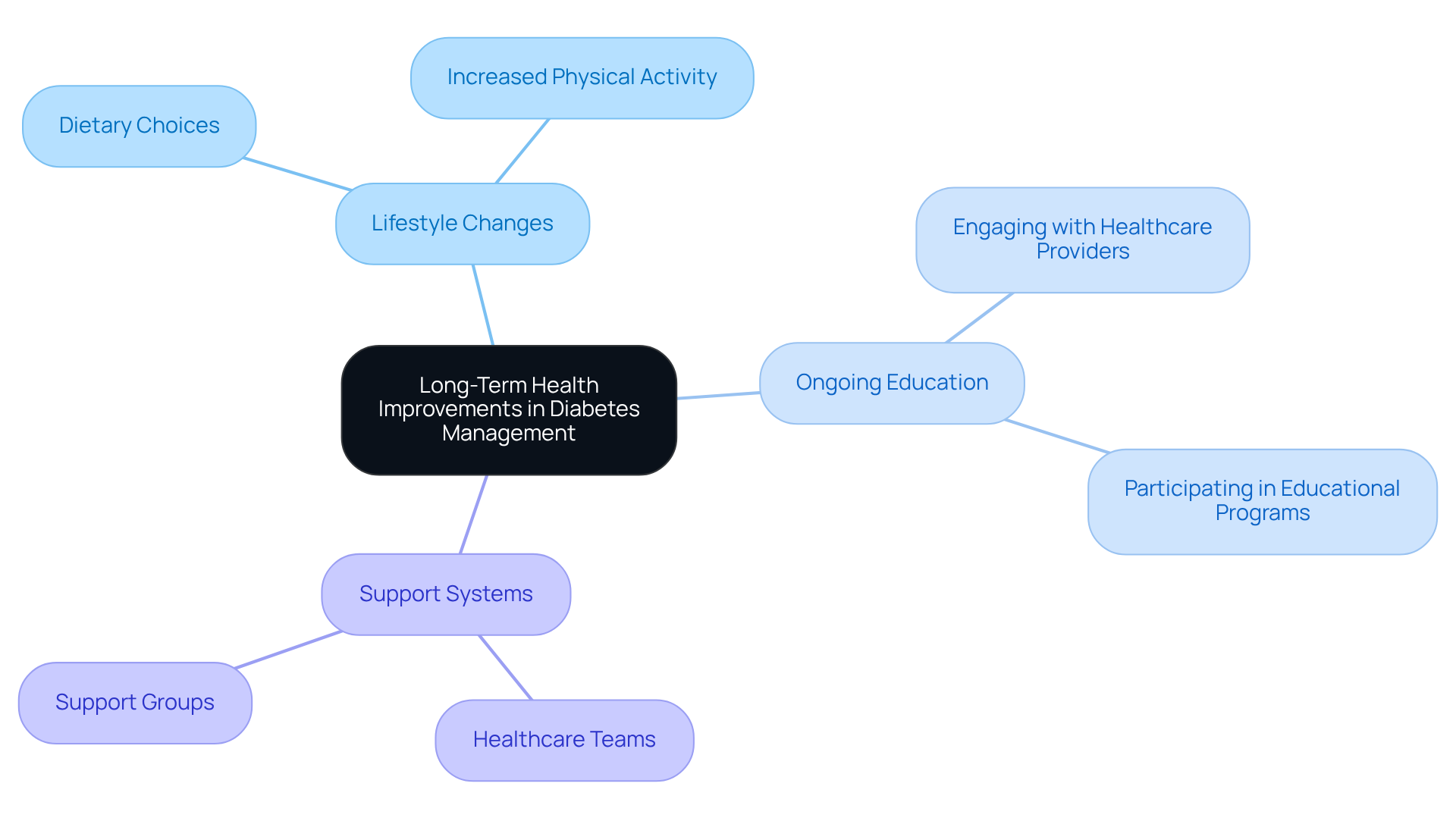Overview
The article titled “6.8 x 6.8: 9 Key Strategies for Effective Diabetes Management” gently addresses the challenges many face in managing diabetes. It recognizes that navigating this journey can be overwhelming, and emphasizes the importance of personalized care. By focusing on lifestyle changes, community support, and continuous monitoring, the article highlights how these crucial elements empower individuals to take control of their health. Through tailored interventions and supportive environments, readers can improve their overall well-being. It’s important to recognize that every small step counts, and with the right strategies, a healthier life is within reach.
Introduction
Managing diabetes can often feel overwhelming, leaving individuals uncertain about their health journey. It’s important to recognize that this complexity is a common experience. However, the path to effective diabetes management is filled with innovative strategies that empower patients to take control of their well-being. This article explores nine key strategies designed not only to promote better health outcomes but also to foster a supportive community, personalized care, and sustainable lifestyle changes. Many patients find that as they seek to improve their blood sugar control and overall quality of life, they wonder: what are the most impactful methods to navigate this chronic condition successfully?
Integrative Wellness Center: 30-Day Diabetes Reset Program for Effective Management
Are you struggling to manage your health condition? The 30-Day Reset Program at Dr. Jason Shumard’s Integrative Wellness Center offers a compassionate and clinically validated approach designed to empower you. This innovative program provides you with personalized plans, including dietary changes, physical activity, and behavioral modifications, all aimed at helping you reset your well-being.
Many patients find that by engaging with this structured plan, they can achieve stable glucose levels without relying on insulin or prescription drugs. Imagine feeling in control of your health again! Within just one month, participants often notice significant improvements in their overall well-being and blood sugar management.
Success stories from former participants highlight transformative experiences, showcasing how this program enables individuals to reclaim their health and achieve lasting results. It’s important to recognize that you are not alone on this journey; support is available to help you every step of the way. Take the first step towards a healthier, more empowered you today.
Personalized Care: Tailoring Diabetes Management to Individual Needs
Personalized care is central to effective diabetes treatment, and it’s important to recognize that each individual’s journey is unique. By evaluating factors such as lifestyle, preferences, and medical history, healthcare providers can develop customized management plans that truly resonate with patients. This personalized approach not only addresses individual needs but also fosters a sense of ownership and responsibility in their wellness journey, leading to improved adherence and results.
Many patients find that transformative experiences, like those shared by individuals who have participated in Dr. Jason Shumard’s 30-Day Diabetes Reset program, illustrate the profound impact of personalized care. For instance, one participant expressed, ‘I lost a lot of weight, have more energy and feel great. I am not depressed anymore and I don’t need my meds anymore!!!’ These heartfelt testimonials highlight the potential for positive change.
Research supports the idea that personalized care plans lead to more regular monitoring of essential health indicators, such as glycosylated hemoglobin A1c and low-density lipoprotein cholesterol. In fact, 75-78% of individuals have their HbA1c and LDL assessed annually. Moreover, those with tailored care plans often show improved medication adherence and achieve treatment goals more reliably. A study involving over 5,000 individuals revealed that those with organized care plans experienced significantly lower rates of unplanned doctor visits and higher prescription rates for essential medications.
As Ilona Mikkola noted, ‘Establishment of a care plan is linked to more intensive and focused attention for individuals with T2D and hypothyroidism.’ These findings underscore the importance of personalized management in enhancing individual involvement and overall wellness results.
If you’re looking to take control of your health, consider how a personalized approach could benefit you. Your journey toward better health can start today, and you are not alone in this process.
Functional Medicine: A Revolutionary Approach to Reversing Type 2 Diabetes
Functional medicine offers a compassionate approach to reversing type 2 diabetes by addressing its underlying causes. It’s important to recognize that this method emphasizes nutrition, lifestyle changes, and environmental factors, enabling individuals to achieve lasting wellness improvements and, in some cases, remission from diabetes. Many patients find that by focusing on these foundational elements, they can experience significant transformations in their health.
This philosophy aligns with Dr. Shumard’s commitment to treating the whole person, rather than just the symptoms. Success stories from individuals who have embraced functional medicine highlight its potential. Have you ever wondered how customized dietary strategies and lifestyle adjustments can lead to remarkable outcomes? Recent research supports this approach, showing that comprehensive lifestyle changes can greatly reduce the risk of diabetes-related complications and enhance overall well-being.
By incorporating these insights, functional medicine not only empowers individuals but also fosters a deeper understanding of how our nutrition and lifestyle choices directly influence blood sugar control. Remember, you are not alone on this journey—there is hope and support available as you take steps toward a healthier future.
Patient Empowerment: Gaining Knowledge for Better Health Outcomes
Patient empowerment through education is essential for improving wellness outcomes in diabetes management. It’s important to recognize that many individuals feel overwhelmed by their condition. By providing thorough information about their diabetes, treatment options, and necessary lifestyle changes, we enable them to make informed wellness choices. This proactive strategy not only motivates patients to take charge of their well-being but also fosters cooperation with their healthcare team.
In San Marcos, CA, many patients find joy in embracing a holistic lifestyle. Incorporating regular outdoor exercise, such as hiking or walking in local parks, can significantly enhance insulin sensitivity and blood sugar control. Additionally, focusing on a balanced diet rich in local produce, like avocados and berries, supports overall health and helps regulate blood sugar levels. Have you considered participating in community wellness initiatives? These programs can offer invaluable assistance and resources tailored for effectively managing blood sugar levels.
Research shows that individuals who receive education on blood sugar management exhibit notable enhancements in self-care practices and blood sugar regulation. By integrating education into chronic illness management, we can foster improved wellness results and empower patients to navigate their wellness journey effectively. Remember, you are not alone on this path; support is available, and every step you take is a step toward better health.
Lifestyle Changes: Enhancing Health Through Daily Choices
Making beneficial lifestyle adjustments is crucial for enhancing health and effectively managing your condition. It’s important to recognize that adopting a balanced diet rich in whole foods, engaging in regular physical activity, and practicing stress management techniques can make a significant difference. Many patients find that adhering to a Mediterranean diet, which emphasizes high intake of fruits, vegetables, whole grains, and healthy fats, greatly lowers their risk of developing this condition. For instance, a recent study discovered that lifestyle changes led to a remarkable 58% decrease in the risk of developing the condition among participants.
Simple daily choices, such as selecting whole foods over processed options and incorporating physical activity into your routine, can yield substantial improvements in blood sugar control and overall well-being. To enhance these efforts, consider utilizing tracking methods like fitness apps and journals. Setting SMART goals—specific, measurable, attainable, relevant, and time-bound—can also be incredibly motivating. For example, aiming for 10,000 steps daily or gradually increasing your exercise duration can significantly boost your motivation and accountability.
Additionally, personalized nutrition plans, such as those focusing on low glycemic index foods or meal prepping to avoid processed snacks, can further support your diabetes management. Success stories from individuals who have embraced these healthy habits highlight the transformative power of lifestyle changes. The Diabetes Health Coach plays a crucial role in helping you recognize and adopt these changes sustainably, nurturing a supportive environment where you can take control of your health and achieve lasting results.
As a practical tip, consider setting a weekly goal to try one new healthy recipe or physical activity. This can keep your routine fresh and engaging, making your journey toward better health feel more enjoyable and fulfilling.
Community Support: Building Connections for Diabetes Management
Community support serves as a vital resource for individuals navigating their condition, providing a nurturing network of encouragement and shared experiences. Have you ever felt alone in your journey? By connecting with others facing similar challenges, patients can exchange valuable tips, celebrate milestones, and foster a sense of belonging.
Support groups, educational seminars, and community events organized by Dr. Shumard’s center not only enhance knowledge but also create a collaborative environment where individuals can learn from one another. It’s important to recognize that this collective approach significantly improves the management of the condition. Studies indicate that social support is linked to better health outcomes, including improved self-care behaviors and lower A1C levels.
Many patients find that conventional diabetes treatments can be concerning, often leading to increased insulin levels and dependency on medications. For instance, M.L., who participated in Dr. Shumard’s 30-Day Diabetes Reset program, shared, “I have lost 55 lbs. My A1C started at 9.1 after 8 months; it is now 5.7.” Such success narratives illustrate the empowerment these connections provide, enabling individuals to take proactive measures in their wellness journeys.
The beneficial changes observed by individuals highlight the significance of comprehensive care and community assistance in effectively managing the condition. Remember, you are not alone in this journey; support is available, and together, we can achieve healthier living.
Continuous Monitoring: Adapting Strategies for Optimal Health
Managing diabetes can feel overwhelming at times, but ongoing tracking of blood glucose levels and other wellness metrics is a vital step toward effective care. Regular evaluations not only help individuals and healthcare providers identify important trends but also allow for timely adjustments to treatment plans. This proactive approach ensures that strategies remain effective and aligns with your evolving wellness needs, ultimately leading to improved outcomes.
Many patients have shared success stories about how utilizing glucose monitoring has transformed their lives. By taking advantage of the latest advancements in blood sugar monitoring, you can adjust your oversight strategies based on real-time health metrics. This not only enhances your overall quality of life but also empowers you to take control of your health journey.
It’s important to recognize that individualized treatment adjustments are crucial. Ongoing monitoring is a fundamental aspect of effective health care, as it allows you to respond to your body’s unique signals. Remember, you are not alone in this journey—support is available, and together, we can navigate the path to better health.
Mental Well-Being: The Psychological Benefits of Diabetes Management
Mental well-being is essential in managing this condition, as many individuals face emotional challenges like stress, anxiety, and depression. It’s important to recognize that nearly half of those living with this chronic condition in the United States experience behavioral issues, which can significantly impact their adherence to treatment plans and their ability to manage their health effectively. By focusing on mental well-being, patients can enhance their overall quality of life and engage more fully in their health management. The American Diabetes Association reminds us that feeling physically well is just half the battle; feeling mentally well is the other half.
Implementing psychological strategies is vital for managing stress and building resilience. Many patients find that techniques such as:
- Mindfulness
- Deep breathing exercises
- Regular physical activity—like hiking at Lake San Marcos or walking the trails at Discovery Lake
can alleviate emotional strain while also improving insulin sensitivity. Furthermore, establishing a strong support system of friends, family, and healthcare providers, along with community wellness initiatives in San Marcos, can provide the motivation needed to tackle health maintenance challenges. Engaging with local support groups fosters a sense of community, which is crucial for emotional well-being.
By acknowledging and addressing psychological difficulties, including signs of emotional numbness and despair, individuals can reclaim control over their well-being. Moreover, it’s essential to note that 3 in 4 individuals affected by burnout have admitted to pausing or disrupting their diabetes treatment due to stress or feeling overwhelmed. This highlights the importance of integrating behavioral wellness services into the management of blood sugar conditions, leading to more effective control and an enhanced quality of life. Adopting a balanced diet rich in local produce and participating in community activities can also contribute to increased energy and reduced anxiety, empowering patients on their journey toward improved well-being.
Nutritional Strategies: Eating for Better Blood Sugar Control
Implementing effective nutritional strategies is crucial for achieving optimal blood sugar control. It’s important to recognize that highlighting complete, nutrient-rich foods while regulating carbohydrate consumption and understanding the glycemic index can significantly influence blood sugar levels. The Diabetes Health Coach collaborates with clients to create personalized meal plans tailored to their health goals, utilizing a functional medicine approach that considers individual health histories and lifestyle choices. This strategy empowers individuals with the knowledge and tools necessary to make healthier food choices, ultimately supporting their journey toward better diabetes management.
Many patients find that incorporating specific tracking methods, such as fitness apps and journals, allows them to monitor their progress effectively. Success stories abound, illustrating how customized meal plans and organized goal-setting have transformed lives. Careful meal planning can truly lead to improved wellness outcomes. Studies consistently show that diets rich in whole foods not only stabilize blood sugar levels but also enhance overall well-being. This establishes them as a fundamental aspect of effective health control, encouraging you to embrace this journey toward better health.
Long-Term Health Improvements: Sustaining Success in Diabetes Management
Achieving long-term health improvements in diabetes management requires a steadfast commitment to sustained lifestyle changes and ongoing education. It’s important to recognize that engaging with healthcare teams, participating in support groups, and utilizing educational resources are essential strategies for individuals facing diabetes. Transformative experiences from those who have participated in Dr. Jason Shumard’s 30-Day Diabetes Reset program highlight the profound impact of personalized care and holistic approaches. For instance, one individual shared, ‘I have lost 55 lbs. My A1C started at 9.1 after 8 months; it is now 5.7.’ This showcases the effectiveness of tailored interventions.
Many patients find that engaging in educational programs leads to improved well-being and a lower likelihood of complications. They often note that consistent engagement with their healthcare providers and educational materials has resulted in meaningful lifestyle adjustments, such as improved dietary choices and increased physical activity. This culture of ongoing education and adaptation not only helps sustain wellness improvements but also nurtures resilience against diabetes-related challenges.
As Bryan Tysinger pointed out, “the social and economic conditions in which numerous individuals with this condition reside, along with the direct consequences of the illness, are crucial to consider in order to create effective strategies that will lessen the labor market penalties linked to this condition.” By prioritizing education and support, individuals can reclaim their health and enhance their quality of life.
Moreover, with 38.4 million individuals identified with this condition in the U.S., accounting for 11.6% of the population, the significance of efficient handling strategies is essential. The total cost of diagnosed diabetes in the United States reached $412.9 billion in 2022, underscoring the financial benefits of lifestyle changes in diabetes management.
Conclusion
Effective diabetes management hinges on a multifaceted approach that empowers you to take control of your health. By integrating personalized care, lifestyle modifications, and community support, you can navigate your diabetes journey with confidence and resilience. The strategies outlined in this article highlight the importance of tailored interventions, continuous monitoring, and mental well-being as essential components of successful diabetes management.
It’s crucial to recognize the transformative power of personalized care plans. Many patients find that the significance of functional medicine in addressing root causes can be a game changer. Education plays a vital role in empowering you, allowing you to make informed choices. Success stories from programs like the 30-Day Diabetes Reset illustrate that with the right support and strategies, remarkable improvements in health are possible, including stabilized blood sugar levels and enhanced overall well-being.
Ultimately, the journey toward effective diabetes management is not one that you need to face alone. By embracing a community-oriented approach and committing to ongoing education and lifestyle changes, you can foster a healthier future. Remember, every step taken towards better health is a step toward reclaiming control over your life. Engage with available resources, seek support, and make informed choices to pave the way for lasting health improvements.
Frequently Asked Questions
What is the 30-Day Diabetes Reset Program at the Integrative Wellness Center?
The 30-Day Diabetes Reset Program is a compassionate and clinically validated approach designed to empower individuals in managing their diabetes. It includes personalized plans focusing on dietary changes, physical activity, and behavioral modifications to help participants reset their well-being.
What benefits can participants expect from the 30-Day Reset Program?
Participants often achieve stable glucose levels without relying on insulin or prescription drugs. Many notice significant improvements in their overall well-being and blood sugar management within just one month.
How does personalized care impact diabetes management?
Personalized care tailors diabetes treatment to individual needs by considering factors such as lifestyle, preferences, and medical history. This approach fosters a sense of ownership in patients, leading to improved adherence to management plans and better health outcomes.
What evidence supports the effectiveness of personalized care plans?
Research indicates that individuals with personalized care plans have regular monitoring of health indicators like HbA1c and LDL cholesterol. Studies show that they experience lower rates of unplanned doctor visits and higher prescription rates for essential medications.
What role does functional medicine play in reversing type 2 diabetes?
Functional medicine addresses the underlying causes of type 2 diabetes by focusing on nutrition, lifestyle changes, and environmental factors. This approach aims for lasting wellness improvements and can lead to remission in some cases.
How does Dr. Shumard’s philosophy align with functional medicine?
Dr. Shumard’s philosophy emphasizes treating the whole person rather than just the symptoms. This comprehensive approach empowers individuals to make lifestyle changes that significantly impact their health.
Are there success stories from participants in these programs?
Yes, many participants share transformative experiences, such as significant weight loss, increased energy, and reduced dependence on medications, highlighting the potential for positive change through these programs.
How can someone get started with the 30-Day Diabetes Reset Program?
Interested individuals can take the first step toward a healthier, more empowered life by enrolling in the 30-Day Diabetes Reset Program at Dr. Jason Shumard’s Integrative Wellness Center. Support is available throughout the journey.
